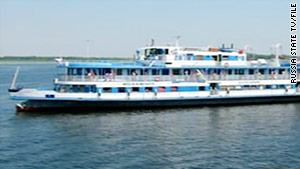PARC DE BADINGILO (© 2011 AFP) - Le Sud-Soudan, qui doit à tout prix développer son économie au lendemain de la proclamation de son indépendance, a l'ambition de devenir une destination de référence pour amateurs de safaris, avec sa riche faune et ses régions sauvages.

"Les gens ont été surpris lorsqu'ils ont découvert, après la signature en 2005 de l'accord de paix entre le Nord et le Sud, que la faune avait survécu" à un demi-siècle d'une guerre civile dévastatrice, note le général Alfred Akwoch, conseiller auprès du ministère sud-soudanais du Tourisme et de la Faune.
"La nature et la faune sont des trésors à préserver", poursuit ce responsable, dans le Parc national de Badingilo, situé à 85 kilomètres au nord de Juba, la capitale du Sud-Soudan.
Cette réserve, récemment inaugurée, abrite plusieurs espèces d'antilopes géantes, ainsi que des girafes, des lions, des guépards et une importante population d'oiseaux.
"La migration saisonnière de la faune du Sud-Soudan n'a d'équivalent qu'en Tanzanie et au Kenya", assure Alfred Akwoch.
Et si le parc de Badingilo s'étend sur 10.000 kilomètres carrés, la zone sauvage est bien plus vaste : c'est la plus grande savane toujours intacte en Afrique de l'Est et une extension de ce domaine à près de trois fois sa taille actuelle a même été proposée.
"Le Sud-Soudan est béni", se réjouit à cet égard Paul Elkan, à la tête de l'Association de préservation de la faune (WCS) du Sud-Soudan, qui aide à mettre en place des parcs afin de perpétuer cette richesse.
Si ces derniers "sont bien gérés, la migration saisonnière (de la faune) dans cette région pourrait devenir la plus grande d'Afrique", va-t-il jusqu'à avancer.
La WCS recueille des informations sur les mouvements des troupeaux via en particulier des observations aériennes et des colliers GPS.
"Nous avons constaté que les années de guerre avaient également créé des zones tampons" pour les animaux, souligne Paul Elkan.
La découverte de "l'immensité et la grandeur" de la faune est comparable à celle d'"une mine d'or", s'enthousiasme pour sa part William Hammink, directeur de la mission locale de l'Agence américaine de développement international (USAID).
"Si le parc peut nous apporter du travail, de la sécurité et des écoles, alors c'est une bonne chose", acquiesce Augustino Kenyi, un ancien de l'ethnie Mundari.
Aujourd'hui, le budget du Sud-Soudan dépend à 98% du pétrole, dont la production devrait diminuer, et il est dès lors symptomatique que Badingilo se trouve sur une concession du géant pétrolier français Total.
Les défenseurs de l'environnement espèrent travailler "en partenariat" avec les compagnies pétrolières pour assurer une bonne gestion des ressources naturelles, souligne M. Elkan.
Si les violences qui embrasent régulièrement la région ne permettent pas d'envisager à court terme une grande industrie touristique, cette réserve pourrait devenir une destination de week-end pour les légions de travailleurs humanitaires présentes à Juba, à seulement deux heures de route.
Mais là encore, les infrastructures font défaut : il n'y a aucun terrain de camping et la route reliant le parc à la capitale n'est qu'une piste sablonneuse qui louvoie entre des panneaux "Mines".
Tout cela ne décourage toutefois pas l'entreprise ougandaise Wildplaces Africa, spécialisée dans les excursions pour touristes fortunés, en négociation pour ajouter Badingilo à son offre.
"Ce qui m'attire, c'est l'étendue de cette région avec des paysages à couper le souffle et relativement peu de désagréments", explique Jonathan Wright, le propriétaire de la société, selon lequel ce parc pourrait "rivaliser avec tous les autres en Afrique" d'ici à 10 à 20 ans.
En attendant, s'y rendre relèvera pendant longtemps encore de l'aventure.
"Si votre avion devait se poser ici, ça prendrait deux mois pour en sortir à pied", lance M. Wright avec un large sourire. "C'est exactement ce qui m'attire."










